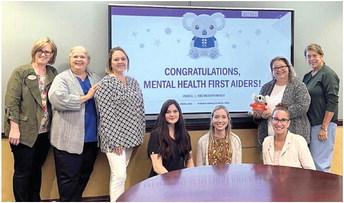Suicide prevention is not a pleasurable topic of discussion, yet it is an important one. Next week is designated as National Suicide Prevention Week. The annual initiative since 1975 is part of a campaign to inform and engage healthcare professionals and the general public on suicide prevention and the warning signs often leading to suicide.
The campaign strives to reduce the stigma surrounding mental illness, and encourage the pursuit of assistance to better support those who have already attempted suicide.
As part of the awareness initiative, healthcare organizations across the country conduct training, educational conferences, and even depression screenings— including self-administered and online tests—to educate healthcare professionals on identifying and referring at-risk individuals to support groups and resources.
Locally, the Osceola Council on Aging (OCOA), along with the Peer Support Coalition of Florida, an organization dedicated to advancing peer support across the state, hosted a Mental Health First Aid course (MHFA) on how to better identify and respond to signs of clinical depression, the varying degrees of mental illness, and substance abuse challenges. The training was held at OCOA’s Kissimmee campus as part of an outreach program for Florida healthcare workers.
“Because of healthcare professionals’ proximity to community members; their opportunity to identify developing mental health illnesses amongst patients, and the field’s higher risk for burnout and mental health imbalances, we focused on educating the healthcare community,” Peer Support Coalition of Florida Program Manager Allison Shenson said.
The primary purpose was to train healthcare workers to recognize the signs and symptoms of mental health nuances and employ crisis deescalation techniques, establish linkages with community-based mental health agencies for referrals and provide education on supportive community resources.
“We also strive to educate medical professionals on the importance of investing in their own self-care. By empowering those in healthcare professions with increased awareness of self-care initiatives, we can support their mental health as well,” Shenson added.
MHFA students participated in the course free of charge through scholarship funding by the Substance Abuse and Mental Health Services Administration.
“We are committed to offering educational initiatives like this while also partnering with mental health providers to address the mental wellness service gap in our community,” said Osceola Council on Aging Chief of Staff Johnola Morales.
According to the National Institutes of Health, 1 in 5 adults in the United States live with a mental illness (57.8 million in 2021), with depression being the most common. The Center for Disease Control cites that in 2021, suicide was the 11th leading cause of death in the United States. Sadly, an estimated one million people per year die by suicide, equating to about one in 10,000 individuals, or “a death every 40 seconds representing around 3,000 every day,” according to the World Health Organization.
While drafting this column, I came across an article in Psychiatric Times, a medical trade publication for psychiatry professionals that stated, “Predicting suicide remains challenging at best. For each suicide, there is often a complex web of life experiences, personality traits, psychiatric diagnoses, cultural beliefs, relationship issues, and acute stressors which converge on a person’s decision to take one’s life.”
That statement hit home as I am sure many of us know someone who has taken their own life; I personally know of someone who committed suicide only last week. With that, I am extremely proud that the Council was part of this recent MHFA course to collaborate on programs to monitor mental health illnesses, in hopes of secondarily, helping decrease these enormous suicide statistics.
For more information on the Peer Support Coalition of Florida, go to https://www.peersupportfl.org. To request a training course for healthcare related workplaces, contact Allison Shenson at allison@peersupportfl.org If you know someone who may need mental health-related resources, go to info@mhacf.org, or call 407-898-0110 or dial 988 for the Suicide & Crisis Lifeline.




